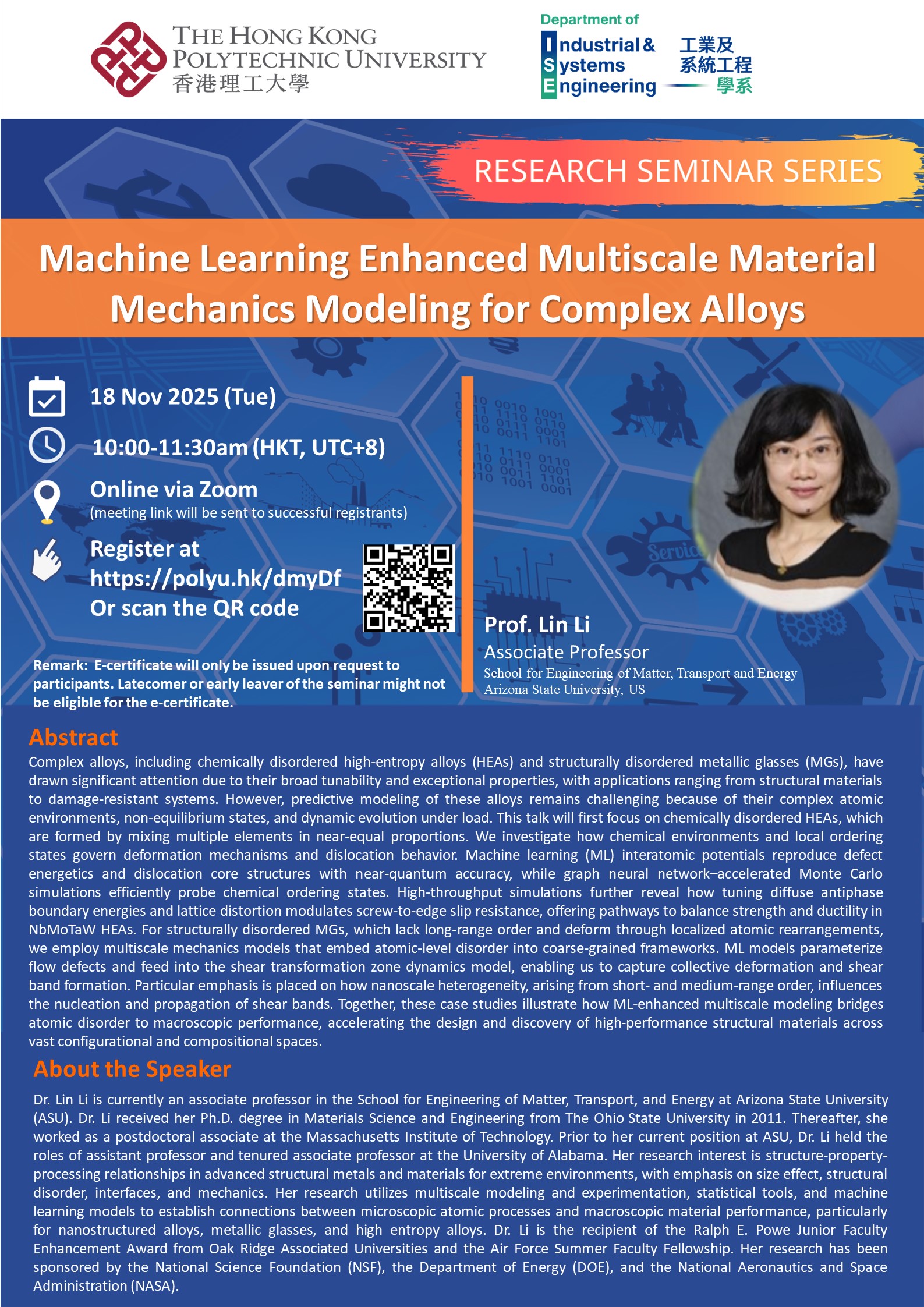Machine Learning Enhanced Multiscale Material Mechanics Modeling for Complex Alloys
Research Seminar Series

-
Date
18 Nov 2025
-
Organiser
Department of Industrial and Systems Engineering, PolyU
-
Time
10:00 - 11:30
-
Venue
Online via ZOOM
Speaker
Prof. Lin Li
Remarks
Meeting link will be sent to successful registrants. If you have enquiries regarding E-certificate after the seminar, please contact david.kuo@polyu.edu.hk.
Summary
Complex alloys, including chemically disordered high-entropy alloys (HEAs) and structurally disordered metallic glasses (MGs), have drawn significant attention due to their broad tunability and exceptional properties, with applications ranging from structural materials to damage-resistant systems. However, predictive modeling of these alloys remains challenging because of their complex atomic environments, non-equilibrium states, and dynamic evolution under load. This talk will first focus on chemically disordered HEAs, which are formed by mixing multiple elements in near-equal proportions. We investigate how chemical environments and local ordering states govern deformation mechanisms and dislocation behavior. Machine learning (ML) interatomic potentials reproduce defect energetics and dislocation core structures with near-quantum accuracy, while graph neural network–accelerated Monte Carlo simulations efficiently probe chemical ordering states. High-throughput simulations further reveal how tuning diffuse antiphase boundary energies and lattice distortion modulates screw-to-edge slip resistance, offering pathways to balance strength and ductility in NbMoTaW HEAs. For structurally disordered MGs, which lack long-range order and deform through localized atomic rearrangements, we employ multiscale mechanics models that embed atomic-level disorder into coarse-grained frameworks. ML models parameterize flow defects and feed into the shear transformation zone dynamics model, enabling us to capture collective deformation and shear band formation. Particular emphasis is placed on how nanoscale heterogeneity, arising from short- and medium-range order, influences the nucleation and propagation of shear bands. Together, these case studies illustrate how ML-enhanced multiscale modeling bridges atomic disorder to macroscopic performance, accelerating the design and discovery of high-performance structural materials across vast configurational and compositional spaces.
Keynote Speaker

Prof. Lin Li
Associate Professor
School for Engineering of Matter, Transport and Energy Arizona State University, US
Dr. Lin Li is currently an associate professor in the School for Engineering of Matter, Transport, and Energy at Arizona State University (ASU). Dr. Li received her Ph.D. degree in Materials Science and Engineering from The Ohio State University in 2011. Thereafter, she worked as a postdoctoral associate at the Massachusetts Institute of Technology. Prior to her current position at ASU, Dr. Li held the roles of assistant professor and tenured associate professor at the University of Alabama. Her research interest is structure-property-processing relationships in advanced structural metals and materials for extreme environments, with emphasis on size effect, structural disorder, interfaces, and mechanics. Her research utilizes multiscale modeling and experimentation, statistical tools, and machine learning models to establish connections between microscopic atomic processes and macroscopic material performance, particularly for nanostructured alloys, metallic glasses, and high entropy alloys. Dr. Li is the recipient of the Ralph E. Powe Junior Faculty Enhancement Award from Oak Ridge Associated Universities and the Air Force Summer Faculty Fellowship. Her research has been sponsored by the National Science Foundation (NSF), the Department of Energy (DOE), and the National Aeronautics and Space Administration (NASA).
You may also like















